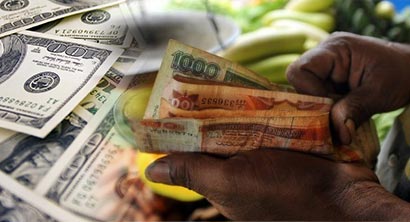IMF urges Sri Lanka to let Rupee slide

The International Monetary Fund urged Sri Lanka to let its rupee keep sliding and not intervene further to bolster the ailing currency as it fell to historic lows.
The currency bottomed out at roughly 160 rupees to the US dollar on Wednesday — its weakest ever point — despite efforts by the central bank to stop its steady decline in recent weeks.
The bank spent $190 million in May alone to ease pressure on the exchange rate, sounding alarm bells at the IMF.
The Washington-based fund urged Colombo — which is emerging from a balance of payments crisis — to conserve its foreign exchange reserves instead of propping up the rupee.
“We think the central bank has allowed for greater flexibility (in the exchange rate) than in the past,” said IMF mission chief Manuela Goretti.
“The rupee should be allowed to depreciate. When you look at emerging markets, the rupee has depreciated less.”
The IMF extended Sri Lanka a staggered $1.5 billion loan in June 2016, the latest tranche of which was released earlier this month.
The international lender said Sri Lanka’s economy had rebounded since growth fell to a 16-year low of 3.1 percent in 2017.
But it warned Sri Lanka was still vulnerable to shocks from at home and abroad and stressed that restructuring the island’s loss-making national airline and reforming its energy sector was vital to maintain the recovery.
One of the biggest drags on the country’s balance sheet is national carrier Sri Lankan, which has accumulated losses and debts of over $2 billion and is a huge burden on taxpayers.
The government has failed to privatise the airline. Investor interest has been lukewarm at home while international partners have also been elusive.
(Source: AFP)

Latest Headlines in Sri Lanka
- Sri Lanka’s remittance inflows continue to grow in February 2025 March 10, 2025
- IGP Deshabandu Tennakoon seeks court order to block arrest March 10, 2025
- Chamal Rajapaksa to contest Local Government Elections under SLPP March 10, 2025
- Aloe Blacc arrives in Sri Lanka to explore investment opportunities March 10, 2025
- Sri Lanka’s Central Expressway cost soars due to corruption and delays by previous governments March 10, 2025



Slide more
sirisena can do little about the dollar crisis but then he ought to realise that unholy alliances could lead to capitulation and and if fiscal policies are to be dictated by the IMF then he ought to think twice about it.
siri lanka can be best described as a bana republic with no banans. Once upon a time there was a lucrative export plantation industry and the industry has fallen aprt due to myopic policies implemented by the plantation indistry. and successive plantation rehabilitation project drove the State Plantations and the JEDB into destitution trying to service the loans and what is left of the plantations abandoned factories and the estates reverting back to jungle and they are beyond redemption.
In the late 60s the department of agriculture was speculating on self sufficiency which was nothing more than a pipe dream and now the government is forced to import the rice to feed the population leaving little dollars to purchase the fertiliser let alone import crude to keep the infrastructure going.
It is not for the IMF to recommend suterity the government ought to do it and save the dollars remitted by workers from th e Middle east something that would run dry becuase of thier fiscal [olicies.
I remember during the early days of that rogue Ravi Karunanayake had vrious crooked strategires that never materialised.
Sirisena is spine lines for he is not in control of the economy nor the security of the coultry.